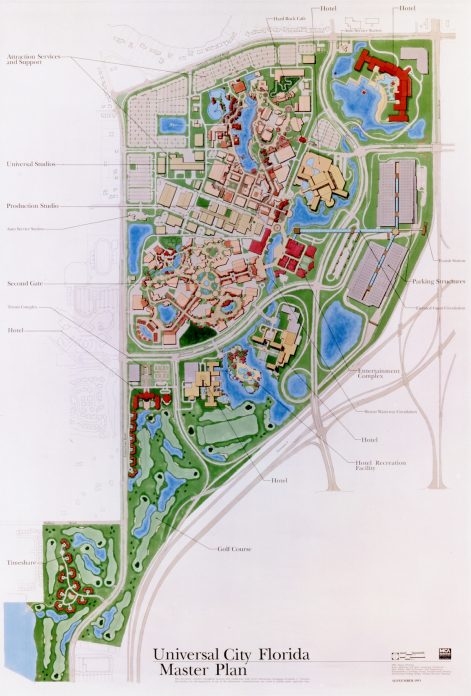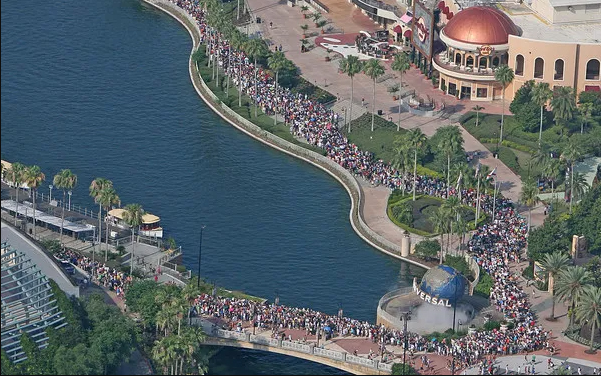In the 1990s, Universal Orlando was a singular theme park destination. It planned an ambitious expansion that it hoped would transform its park into a multi-day destination to rival Walt Disney World. The company acquired a vast amount of land for new theme parks and hotels in preparation to create its “Universal City,” only to sell it off amid corporate and financial turmoil.
Now, almost 20 years later, Universal Orlando has opened Epic Universe,
The road to get Universal Orlando’s master plan back on track took a lot of back-and-forth between ownership, some luck, and a significant partnership with a “boy wizard”.
Seeds of Expansion
Universal’s parent company, MCA Inc., unveiled a grand vision for the future: Universal City, Florida. The proposed expansion wasn’t just a theme park project – it was a multi-billion-dollar destination resort designed to rival Walt Disney World in both size and ambition.
Borrowing its name and inspiration from the original Universal City in California, the blueprint included new theme parks, an entertainment complex, hotels, a golf course, and a production center.

By the mid-1990s, Universal’s ambitious expansion plans had stalled.
The original Universal Studios Florida park had gone significantly over budget and struggled with operational issues during its early years, placing a heavy strain on capital. In 1995, MCA was acquired by Seagram Company Ltd., leading to a shift in corporate priorities that deprioritized large-scale theme park investment.
By 1997, the Universal City concept was shelved, replaced by a scaled-back resort vision that ultimately debuted in 1999 as Universal Studios Escape – featuring Islands of Adventure, three on-site hotels, and the CityWalk entertainment complex.
Seagram was still adamant on expanding the resort, and in 1998, they purchased over 2,000 acres of additional land just a few miles south of defense contractor Lockheed Martin. Universal’s plan for this “South Complex” included more theme parks, resorts, and extensive retail and entertainment facilities.
Universal, then known as the Universal Studios Recreation Group, even filed development plans with Orange County outlining their massive resort project, which would have effectively doubled Universal’s footprint in Orlando.
Financial Issues
Those development plans soon collided with harsh realities. In 2000, French conglomerate Vivendi merged with Seagram, while the Blackstone Group, a private equity firm, acquired 50% ownership later in the year, leading to co-ownership of the resort.
Vivendi and Blackstone were forced to make some tough financial decisions with an underperforming resort, which notably saw a rebrand from Universal Studios Escape to Universal Orlando. By 2002, Universal Orlando found itself financially strained. Attendance didn’t meet expectations, primarily due to attendance plummeting after the 9/11 attacks, and the park was burdened by heavy construction debt.
Desperate to raise cash, Universal approved selling off the prized expansion land in 2003 for $70 million to real estate developer Stan Thomas.
All the land that Universal had assembled for its future growth was now gone.
Despite the sale, Universal placed deed restrictions on the land, prohibiting the development of large-scale theme parks or amusement attractions.
After the 2003 purchase, Stan Thomas announced plans to turn the former Universal expansion plot into a massive “urban resort” development. Early proposals called for hotels, a shopping district, golf courses, and other attractions to create a sprawling vacation and convention destination.
However, Thomas’s project faltered amid the real estate bust. As the economy dipped, the developer ran into financing troubles, especially during the Great Recession, and the envisioned resort never materialized.
Meanwhile, by 2004, the cash-strapped Vivendi sold an 80% stake in Universal’s entertainment assets to General Electric, merging them into NBC to form NBCUniversal. Universal Orlando, now under the control of GE’s NBC division, had lost its expansion land and appeared to have shelved any near-term plans for a new theme park.
The Universal Decade
In 2007, Universal secured the rights to bring the Wizarding World of Harry Potter to life after a highly competitive bidding war. The franchise’s creator, J.K. Rowling, ultimately chose Universal over Disney due to Universal’s willingness to offer creative control and deliver a more immersive, faithful experience.
The partnership marked a transformative moment for the theme park industry, redefining immersive land design and fueling Universal’s new era.

When the Wizarding World of Harry Potter opened in 2010, Universal Orlando saw considerable changes in its theme parks, dramatically revitalizing the resort. Attendance surged, and revenue followed.
After a highly successful year, Comcast began buying a controlling stake in NBCUniversal in 2011 and, by 2013, had become the full owner of Universal’s theme parks, acquiring the remaining ownership from Vivendi and Blackstone.
Comcast had long had its eyes on the theme park business, once trying to acquire the Walt Disney Company in 2004. The bid came at a time when Disney was embroiled in internal turmoil, highlighted by the “Save Disney” campaign led by Roy E. Disney and Stanley Gold, who criticized CEO Michael Eisner’s leadership and called for his ouster. Despite the pressure, Disney’s board rejected Comcast’s offer and eventually withdrew its bid.
Comcast saw the parks as a core business and invested heavily. NBCUniversal CEO Steve Burke set a goal in 2013 to remake Universal Orlando into “a family destination in and of itself – not an add-on attraction for somebody who’s spent three or four days someplace else,” signaling a long-term commitment to expansion.
There was, however, one big obstacle: Universal Orlando lacked land. Meanwhile, Universal’s former expansion parcel sat empty and undeveloped.
Despite this, Universal continued to expand its theme parks, adding a second Wizarding World in Universal Studios Florida (Diagon Alley), Volcano Bay water park, several new resorts, and growing its other parks worldwide.
Universal Orlando’s fortunes rebounded under the new management of the Comcast Corporation.
The Epic Revival
In 2015, an opportunity arose when the original expansion plot sold to Stan Thomas was foreclosed and put up for sale.
Flush with theme-park profits, Comcast jumped at the chance to regain the once-prized expansion land. Due to financial issues with Thomas, the property had fallen into the hands of an investment firm, Colony Capital.
Finally, in 2016, Universal began purchasing back the land it once owned, first acquiring 475 acres for $130 million. Several years of additional, smaller land purchases, behind-the-scenes planning with city and county officials, and the resolution of the old deed restrictions culminated on August 1, 2019, when Universal finally went public with its big plans.
“Our new park represents the single-largest investment Comcast NBCUniversal has made in its theme park business and in Florida overall,” said Brian L. Roberts, Chairman and Chief Executive Officer of Comcast Corporation. “It reflects the tremendous excitement we have for the future of our theme park business and for our entire company’s future in Florida.”

Work on Epic Universe was underway. Site clearing had begun in late 2019, and by early 2020, Universal was deep into utility installation, road infrastructure projects (like the Kirkman Road extension), and early groundwork for backstage facilities. The park’s central layout had been finalized in internal documents, with vertical construction expected to rise later in the year.
Then, in March 2020, the world stopped.
As COVID-19 spread across the globe, the tourism industry collapsed, with Universal, like nearly all major theme park operators, shutting down its parks. With little clarity on when the situation would improve, Universal decided to indefinitely pause construction on Epic Universe.
On July 31, 2020, Comcast formally announced the project had been delayed, citing the pandemic. While they stressed that Epic Universe wasn’t canceled, the project was clearly facing major uncertainty.
Construction was able to resume almost a full year after the pause began, with Comcast citing improving economic conditions and a rebound in tourism as key factors in the decision. Ultimately, the pause delayed the theme park’s opening by about two years, shifting the expected opening from 2023 to 2025.
Of course, a few notable hurricanes also impacted Central Florida, but that ultimately caused a delay of a few days.
And now, roughly 25 years after Universal first bought the land from Lockheed Martin, and more than 20 years after financial struggles forced the company to let it go, what was once an abandoned expansion dream has come roaring back to life, as Universal Orlando’s next great theme park is now open.
Epic Universe is Universal’s biggest swing since Islands of Adventure opened, and a much bolder statement. In 1999, Universal was often viewed as the “little guy”. Now, Universal Orlando is recognized as a major vacation destination, aiming for guests to prioritize their plans with Universal in mind, rather than treating it as an additional option.
It presents an unmatched level of theme park immersion and innovation, transporting guests to the expansive worlds of Super Nintendo World, Dark Universe, How to Train Your Dragon – Isle of Berk, The Wizarding World of Harry Potter- Ministry of Magic, and Celestial Park. In addition, three new hotels were built, including the Helios Grand Hotel, which is adjacent to the new theme park.
As Epic Universe is now open, we’ve reached a full-circle moment: the very land sold off in hard times is now the springboard for Universal’s future.

Stay tuned to Inside Universal for all the latest news on Universal Parks & Resorts and follow along on our forums & discussion boards.
Looking to book that EPIC Universal vacation? We recommend using our friends at MEI-Travel to help plan your next trip to Universal Orlando or Universal Studios Hollywood.

